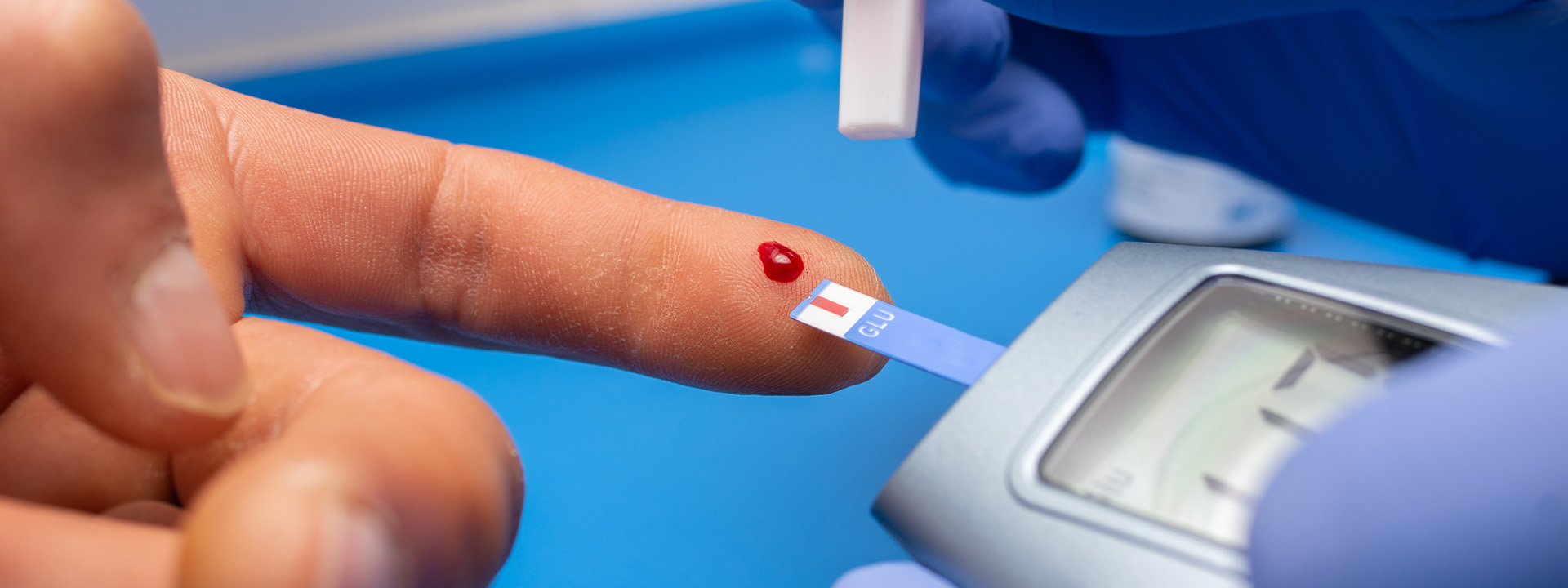
DIABETES MELLITUS
To provide the best pharmaceutical and clinical care in high quality, modern technology, and most reasonably priced cost for the patients.
The principal hormone, Insulin produced by the beta cells of the pancreas helps the body to utilize glucose. When Diabetes occurs, there is excessive glucose in blood and urine due to inadequate production of insulin or insulin resistance. Following a proper diet, physical activity and taking the prescribed drugs as per the doctor’s instruction will help them manage it better.
Risk Factors:
-
Hereditary factors
-
Sedentary Life
-
Unhealthy eating practices
-
Obesity
-
Ageing
Symptoms of Diabetes:
-
Excessive thirst
-
Loss of weight
-
Easy tiredness
-
Slow healing of cuts and wounds
Types of Diabetes:
-
Type-1 diabetes
-
Type-2 diabetes
-
Gestational Diabetes
-
Age onset diabetes
Diabetes can be managed through:
-
Diet
-
Exercise or increased physical activity
-
Drugs
-
Communication and awareness
Risk Factors:
A diabetic diet should be balanced with carbohydrates/proteins /fat/vitamins/ minerals and fibre containing foods. It is like a normal diet with a few modifications that need to be made as per age, gender, weight, and physical activity, the kind of medications or insulin you take. According to the National Institute of Nutrition (ICMR), the total daily intake of calories in the diet for a diabetic should be distributed as:
-
Carbohydrates – 55-60% of total calories (1gm =4Kcals)
-
Proteins – 15-20% of total calories and (1gm= 4Kcals)
-
Fat-20-25%. of total calories (1gm=9Kcals)
Carbohydrates:
For a person who has diabetes, they need to restrict and alter the kind of carbohydrates added to the diet. Cereals, Pulses and Whole grams contain complex carbohydrates and can be included in the diet. But refined carbohydrates containing foods like Maida /sugars/sweets etc. can cause a rapid rise in blood sugar and are not recommended. The total amount of carbohydrates added to the diet need to be distributed in accordance with the needs throughout the day for breakfast, lunch, snacks and dinner.
Proteins:
The food sources are Pulses/Whole grams, milk and milk products, egg, lean fish, lean meat, nuts, oil seeds etc. The sources from plants also add fibre to the diet and animal sources provide us with high biological value protein. But red meat needs to be avoided as it contains excess fat. The inclusion of proteins in the diet will help in improving metabolism.
Fats:
When it exceeds the recommended amount, leads to Obesity and being Overweight. Have omega-3 fatty acids containing foods that help to improve good cholesterol and have anti-inflammatory property too. Fish, Walnuts, Flaxseeds, Chia seeds, Fenugreek seeds etc are the sources.
Vitamins and Minerals:
Found in green leafy vegetables, fresh fruits, dairy products, fish, nuts, etc helps to maintain immunity and stay away from infection.
Dietary fibre:
Fibre present in vegetables, fruits, legumes and fenugreek seeds is soluble in nature and is relatively more effective in controlling blood glucose and serum lipids compared to the insoluble fibre present in cereals and millets. According to the National Institute of Nutrition (ICMR), an intake of 25g of dietary fibre per 1000 calories is considered to be optimum for a diabetic.
Fenugreek seeds are a rich source of fibre. According to the National Institute of Nutrition, the addition of fenugreek seeds to your diet helps to reduce blood glucose levels and lowers the levels of serum lipids such as cholesterol and triglycerides.
Alcohol:
It may lower the blood glucose below certain critical normal limits and result in hypoglycemia. The extra calories present in it may increase the weight of a diabetic. It is better for a diabetic to avoid alcohol as it can put him at risk especially when the blood sugars are high.
Healthy Foods recommended:
-
Idli/Dosa with Sambar
-
Whole wheat Bread Sandwich
-
Upma mixed with vegetables
-
Poha mixed with vegetables
-
Whole wheat Chapathi with mixed vegetable curry
-
Rice with Dal Or any non-veg /Vegetables/curd
-
Any Millet Upma with vegetables /khichdi
-
Cream Removed milk
-
Marie Biscuits -2-3no.s/day
Healthy Snacks:
-
Nuts /Roasted Gram Dal/Peanuts
-
Vegetable salads mixed with flaxseeds/sesame seeds
-
Steamed Sprouts /Sundal
-
Besan Roti mixed with onion/tomato/flaxseeds
Beverages recommended:
-
Tea/Coffee/Green Tea ( Not more than two)
-
Milk (cream removed)/Curd/Buttermilk
-
Lemon juice with pudina/pepper
*Point to be noted: Don’t follow glycemic index references online as all foods with low GI need not necessarily be healthy. Eg: Whole wheat puri has a lower GI than whole wheat phulka. Meet the expert and get a customized meal plan. “Live the healthy life . Walk away from risks by following the proper diet”.
